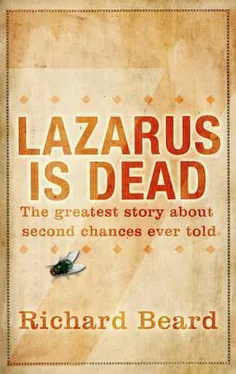This solution makes divine sense. Lazarus is about to die. To his family, and to all his friends except one, his suffering will seem to come from nowhere, with no obvious cause. This makes him the same as everyone else. Nature is indiscriminate. It can warp the human body in terrible ways and at any time, and remember that Jesus wept. In the bible he weeps on this one occasion only, and there must be a reason for Jesus weeping, which has never been adequately explained.
Lazarus must suffer extremely. Though not suspiciously so. Nobody should guess that divine forces are at work, because that would lessen the impact of the eventual miracle. As far as possible the rules of cause and effect must apply. However abrupt his deterioration may appear, every change will have its clearly determined catalyst.
Though not yet, even if on his latest journey to Jerusalem the city has never seemed further away.
Lazarus is light-headed long before he reaches the second valley, and only vaguely returns greetings from acquaintances he ought to acknowledge. He feels grey from his tongue through his innards to his anus. He doesn’t stop to contemplate the Bethesda pool, not today, but stumbles forward, eyes fixed ahead.
He enters Jerusalem through the Sheep Gate, but ignores the most direct route to the Temple. He avoids the street that leads to Isaiah’s house.
Lazarus has choices, and options. He is in charge of his own life, and amid the disorder of the city he changes his mind. Anyone can change their mind.
4
Lydia works in the Lower City in a narrow building jammed between alleys. Her windowless room is beneath a sloping roof, reached by a tapered ladder that rises to a trapdoor in the first-floor ceiling. This is Lydia’s idea. If a man can’t climb the ladder, if he’s that tired or drunk, she doesn’t want his custom.
Halfway up the ladder Lazarus rests and swallows a gulp of air, ignores the ticking in his inner ear, shakes his head. The rash on his arms flares up. He climbs another rung.
Lydia has beautiful feet. The soles of her feet are waxy and clean, as if she never walks on common ground. He sees her feet, then the curve of her lower legs. The rest of her is wrapped in a length of purple cloth tied beneath her arms, and the skin of her shoulders is burnished by lamplight, the flames reflecting in the broad silver bracelet on her upper arm.
‘If it isn’t Lazarus.’
She is unprepared for the paleness of his face, the tightness of the skin across the bones. And the smell. She hides her wince, tucks her legs beneath her, picks up a cushion which she hugs to her chest.
Lazarus hauls himself over the rim of the opening. He lies still, his cheek crushed into the softness of a heavy rug, his staring eyes level with the cushions landscaping the floor. He flops over onto his back. The walls are softened by Persian drapes, and their swaying rounded shadows.
‘I’ve been ill,’ Lazarus says, eyes open to the furnishings.
‘I know. I’ve missed you.’
Lydia’s room is like a version of heaven, somewhere Lazarus and other men would like to come instead of dying. He climbs onto his knees and tilts the trapdoor. It balances on its hinges, then falls shut.
I want to clear up the business of the smell. Lazarus will die and his death will confuse the issue, but for two thousand years the Lazarus story has been associated with an unpleasant smell. This is largely Martha’s fault.
‘ “ But Lord,” said Martha, the sister of the dead man, “by this time there is a bad odour, for he has been there four days ” ’ (John 11: 39).
Or as the smell is forcefully recalled in the Mystery plays ( The Raising of Lazarus , the Hegge Cycle, 1451): ‘He stynkygh ryght fowle longe tyme or this.’
The standard explanation for the smell involves Martha’s pragmatism. Lazarus will die six months from now, in the Judaean spring, when seasonal temperatures begin to rise. Her brother’s body is a body like any other. Inside the tomb the corpse will rot, and organic decay does not smell good.
This is not why Martha mentions the smell. She is confused by Jesus heading towards the tomb — she can’t understand what he’s doing, and gabbles the first thing that enters her head. She is buying herself time to think, because she prepared the body herself. Lazarus is wrapped in sweet-smelling herbs and perfume and linen, Martha having doggedly observed every ritual of cleansing, every bitter gesture of interrupted love.
Martha does not take short cuts. It is not in her character. Therefore the corpse of Lazarus will not smell, not if it was prepared by Martha, not after only four days. The memory of the smell, like the memory of his decaying body, comes from the period before the death of Lazarus.
He scratches a fresh mosquito bite on the bone of his wrist. He shivers, even though it is warm in Lydia’s attic. The bite itches. He scratches. It bleeds.
It itches.
He sits back on his heels, sinks into a rug. He’d expected to feel more alive than this. He slaps the side of his neck.
‘I hear you’re engaged,’ Lydia says. She hadn’t meant to say anything. It was unprofessional. ‘Was that because you were ill? Probably you weren’t thinking straight.’
‘We’ve set the date for the betrothal. Two months from now.’
Lydia takes another cushion and stacks it on the first. She finds a loose stitch. ‘Nothing is set in stone.’
‘I should have told you. I’ve been ill. You know that.’
‘I heard the news at the Temple. Did you think I wouldn’t be interested?’
‘A man without a wife is incomplete.’
‘That’s what they say. Unlike a whore without a husband.’
‘Don’t. I didn’t come here to argue.’
‘I’m sorry. I know why you came. I’ll find the best oils, to celebrate.’
‘I don’t do this with just anyone,’ Lazarus says.
‘I know.’
She knows what he wants, and out of habit they act out their roles. Lazarus has always insisted that they’re special, both of them. He is Lazarus king of the Jews; she is his queen. Lydia unstops a flask of nard, one of the first luxuries for which they’d developed a taste together: Lazarus preferred it to the smell of sheep. So did she.
Lazarus unpeels the purple cloth and Lydia stretches out flat on her stomach on the rugs, hands limp above her head. He admires her back and buttocks, and instantly believes he feels better. Only he, Lazarus, has ever truly appreciated her stunning nakedness.
He takes the perfumed oil and rubs a handful into her back. She is crying silently, a tear trapped in the flare of her nostril, but she doesn’t understand. With more money he’d have made her exclusively his.
‘This is the last time,’ he says. ‘I’m sorry.’
He’ll live a chaste life in return for his health. He’ll stop making visits to Lydia, honestly he will. Anything to avoid living obsessed by sickness, like an old man scared of death.
‘Whenever you’re ready,’ she says. She wipes the tear away with her knuckle, sniffs once, twice, rests her cheek on her hands.
Lazarus swallows a cough. He holds his breath with his fingers on his chest.
Lydia turns and reaches out to him.
He holds up one hand, his face turning red.
‘I know,’ she says. ‘It’s often the last time.’
He aims to fend her off but instead grabs her hair. He pushes her face away so she doesn’t have to smell him, but then it overwhelms him, a coughing fit that sets Lydia free and has him bucking on his knees with his weight on his arms.
The effort exhausts him. He collapses onto his side and drops a forearm across his face. He is so hot, but the worst is over, is probably over. It hurts to close his eyes.
The Lazarus smell is possibly the only instance in classical painting of smell as a recurrent motif. It insinuates itself into image after image, such as a Limbourg brothers’ illumination in the Très Riches Heures (1416). A clean-shaven Lazarus is shown emerging from the tomb, and of the fourteen bystanders four are covering their noses, three with their hands and one with the bunched front of his tunic.
Читать дальше












